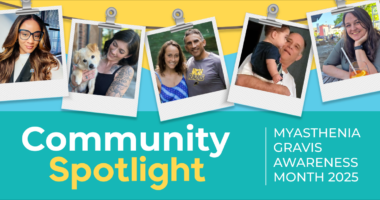FDA approves rozanolixizumab, known as Rystiggo, to treat gMG
Decision covers adults with antibodies against the AChR and MuSK proteins

The U.S. Food and Drug Administration (FDA) has approved rozanolixizumab, under the brand name Rystiggo, to treat adults with generalized myasthenia gravis (gMG) who have antibodies against the acetylcholine receptor (AChR) or muscle-specific tyrosine kinase (MuSK) proteins.
Rystiggo is now the only FDA-approved therapy for patients with anti-AChR or anti-MuSK antibodies, the two most common MG-causing antibodies.
“No two people living with gMG experience the disease in the same way, so we can’t take a ‘one size fits all’ approach to disease management,” Iris Loew-Friedrich, executive vice president and chief medical officer at UCB, the therapy’s developer, said in a company press release.
Rystiggo (rozanolixizumab) works to prevent the breakdown of IgG antibodies
“Disease management should be based on the clinical needs and preferences of the individual patient, and the aim of treatment is to help restore that patient’s ability to carry out activities of daily living,” Loew-Friedrich added. “The approval following priority review of Rystiggo is a testament to this medicine’s potential as a generally well-tolerated treatment option that is targeted to the individual needs of patients.”
The FDA accepted UCB’s application for approval in January, placing it under priority review, which shortens the agency’s review time from a standard 10 months to about six months. Priority review is granted to therapies expected to offer a significant advantage to people with serious or life-threatening diseases.
As specified in its FDA label, Rystiggo should be administered via a subcutaneous, or under-the-skin, infusion with the help of an infusion pump, once weekly for six weeks. Additional treatment cycles are given based on a patient’s clinical response. The therapy’s recommended dose and infused volume are dependent on a patient’s body weight.
The treatment is expected to be available to patients in the U.S. in the coming months, the company said.
Similar approval requests are before regulators in Europe and Japan. Reviews are underway and decisions are expected next year.
Rozanolixizumab is an antibody that targets the neonatal Fc receptor (FcRn), a protein responsible for preventing the breakdown of immunoglobulin G (IgG) antibodies in the bloodstream. The self-reactive antibodies that drive autoimmunity in MG belong to the IgG family.
By binding to FcRn, it is expected to speed the breakdown of these harmful antibodies in the bloodstream. As such, Rystiggo works via a mechanism similar to Argenx’s Vyvgart (efgartigimod), which is approved in the U.S. to treat adults with gMG who are positive for anti-AChR antibodies, found in about 85% of patients.
Anti-MuSK antibodies, occurring in about 6% of patients, often are associated with a more severe and harder to treat form of MG.
“We want to thank UCB for their continued commitment to the MG community to bring a new FDA-approved treatment option for generalized myasthenia gravis to patients and their treating physicians,” said Samantha Masterson, president and CEO of the Myasthenia Gravis Foundation of America (MGFA). “People living with generalized myasthenia gravis continue to experience significant unmet medical needs.”
The FDA’s decision was backed by data from the Phase 3 MycarinG trial (NCT03971422), which enrolled 200 adults with gMG, 179 with anti-AChR antibodies and 21 with anti-MuSK antibodies.
Participants were randomly assigned to receive Rystiggo (7 or 10 mg/kg) or a placebo, given as a subcutaneous infusion once each week for six weeks, followed by an eight-week observation period to determine treatment safety.
Meaningful gains seen with treatment in Phase 3 MycarinG trial
Trial results across its entire patient population showed that Rystiggo led to significant and clinically meaningful improvements in MG Activities of Daily Living (MG-ADL) scores, a patient-reported measure of disease severity, relative to those on a placebo. Specifically, Rystiggo-treated patients saw a mean 3.4-point reduction in these scores, signaling improvement in activities such as breathing, talking, swallowing, and rising from a chair, from the start of the trial to day 43. This amounted to a significant difference from patients in the placebo group, who had a slight drop of less than one point in their MG-ADL scores.
Treatment also led to greater improvements in Quantitative MG (QMG) scores, a clinician-rated measure of symptom severity. Here, Rystiggo-treated patients saw their scores drop by a mean of 5.4 points in those treated at 7 mg/kg and 6.7 points in the 10 mg/kg group from the trial’s start to day 43. Patients on placebo had a 1.9-point drop in these scores, a significant difference.
“gMG can cause unpredictable fluctuations in severity and frequency of symptoms, which are often debilitating and can substantially impact the lives of patients. People living with gMG often face treatment options that are broad-acting, and that have traditionally only offered symptomatic relief,” said Vera Bril, a professor of neurology at the University of Toronto and a lead investigator for MycarinG. “There is a significant need for new, innovative treatment options.”
Subgroup analyses indicated that improvements were similar in patients with antibodies against MuSK, and that Rystiggo was effective regardless of disease duration, prior treatments, or initial disease severity.
After completing the MycarinG trial, participants had the option to enroll in either of two extension studies.
In MG0004 (NCT04124965), all enrolled were given weekly infusions of Rystiggo for up to a year. After finishing at least six treatment visits, participants then could transition to MG0007 (NCT04650854), which is concurrently evaluating weekly treatment given in six-week cycles, with the timing between cycles tailored to each individual’s symptoms.
Rystiggo has been shown to be generally safe and well-tolerated, with the most common side effects being headache, diarrhea, fever, and nausea.
“We are proud to support the MG community with solutions to help improve patient lives, including a new FDA-approved treatment,” Loew-Friedrich said. “We are so grateful to the patients, care partners, and investigators who participated in the MycarinG study, and to our employees and collaborators, whose dedication … made this important milestone possible.”
UCB also has applied to U.S. and European regulators seeking the approval of zilucoplan, its other investigational gMG therapy, for patients with anti-AChR antibodies. Decisions here are possible by the end of the year.






